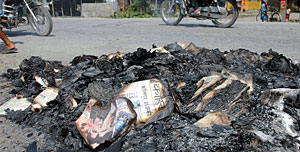 RAJESH KC |
The Maoists have decided on a two-pronged strategy to make the media speak in their favour: inveigle, if not intervene.
The preliminary draft of the party's national media policy has advocated a strategy of neutralising its critics and transferring media ownership to the hands of its sympathisers. The internal meeting of the party's Publicity and Publication Department of the State Committee has categorised media based on ownership: government run, party run and privately run. Based on contents, they are: pro-party, neutral and antagonistic media. The meeting also proposed the establishment of a "pro-public" daily newspaper and television channel as well as a media mechanism at the South Asian level.
A five-page long draft policy has suggested a strategy to have more favourable coverage and to bring the media into the Maoist fold. It has proposed separate regulations for print, audio and visual media. Dinanath Sharma, head of the Publicity and Publication Department, in a joint meeting with Pushpa Kamal Dahal and representatives of "revolutionary" journalists, proposed a central publication house in public-private partnership.
Under the heading of 'publication house', sub-clause of Clause 11 says the party's publication department should look after editorials while the opinion pieces should be monitored by the publication house. Article 12.2 says specifically that 'initiatives should be taken to make ABC, Sagarmatha and Avenues television pro-Maoist'.
Clause 6.1 on Policy on Government Media, says 'efforts should be put to exploit government media to their benefit' and recommend training and mobilisation through the Revolutionary Journalists' Association. The same clause however has mentioned the need to 'establish rights as per democratic norms' and warns those who go against these norms 'should be dealt with'.
The policy recommends a good relationship with media staff rather than the owners. The paper states the quality, trend and content of the media will be closely monitored and 'negative aspects' should be dealt with on political and theoretical fronts. It has also proposed all media (print and radio) be run under a single roof to operate radio and cable TV in the regions and districts.


